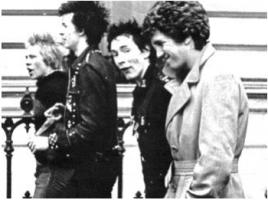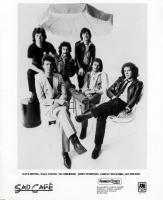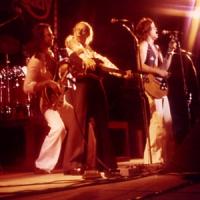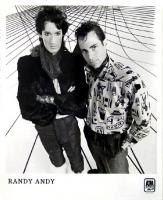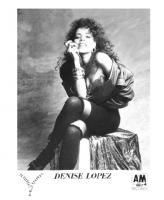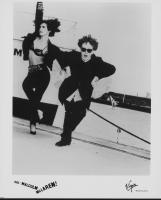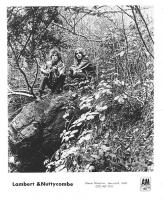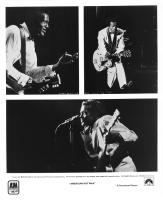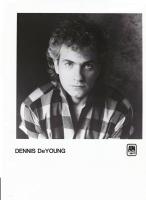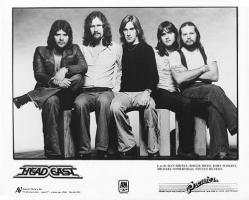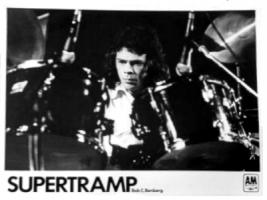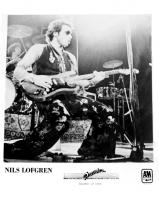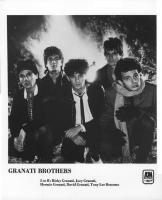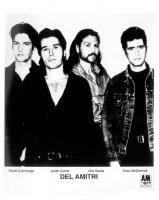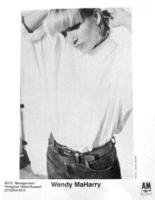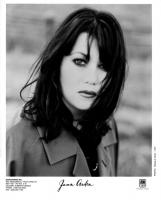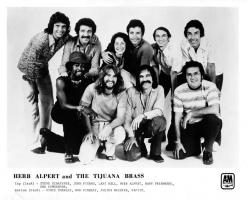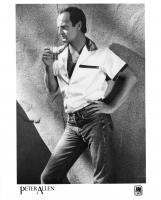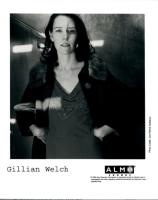Sex Pistols
We had the Sex Pistols but that fell apart. They were on A&M for a week in March '77, and it was longer than they deserved to stay.
The Pistols were too demanding, too crazy, too drugged out, and as far as I'm concerned, just nonsense. I can go for somebody who's flamboyant, for craziness, y'know, but when it turns on you then it doesn't matter how good an artist is. They were so self-centered they didn't care about anybody else. The Pistols were very rude to our London staff and there was a scene in our offices there. We had some money invested in them but Jerry and I agreed, 'let's get them the fuck off, who needs that?'
--Herb Alpert, Goldmine April 1980
I was in the office the day they walked in. I didn't get it. I don't like that stuff. I'm not crazy about music that preys on the weaknesses of society. I like music that uplifts people.
--Herb Alpert, Goldmine April 1980
Negotiations to sign the Sex Pistols began on January 5, 1977 when manager Malcolm McLaren played eight Pistols songs for Derek Green, A&M Managing Director in England. The Sex Pistols were signed privately to the label on March 9, 1977. Derek Green signed them at Rondor in London. He said, "I did it here because I wanted to delay any clash between them and my staff as long as possible. It came as quite a shock, when the signing took place, that Glen Matlock wasn't in the band. It had been Matlock's name all the way through negotiations, and then on the day there was Sid Vicious--an unknown quantity."
The public signing was staged on March 10 outside Buckingham Palace. Derek Green told Billboard, "Signing the Sex Pistols gives us a unique business opportunity to be involved with a new force in rock music, spearheaded by this group.... I believe this group will effect some major changes in recorded music." He also said A&M would not "exercise any control over the group's public behavior." The deal was for one years and enough tracks to be an album of normal playing time. The advance on the contract was estimated to be worth about $240,000. It covered equipment, recording costs and other items. The advance would be paid back through royalties from record sales. A&M agreed to underwrite tours of the United States and United Kingdom.
The Sex Pistols, however, had another record: their reputation for offensive behavior. During the private signing, the band trashed Rondor's office. Their conduct at the public signing, and the reaction it caused among other A&M artists who questioned whether the Pistols could fit into the A&M "family", caused Alpert and Moss to buy out the Pistols contract. They were dropped from the artist roster on March 16. On March 16, the cover of Daily Mirror ran a piece on the band's removal reporting A&M paid £75,000 to end the contract. Billboard subsequently reported, "Dumped by A&M for 'bad behavior after finalization of the deal.'" A&M's John Deacon said, "The decision was taken by Derek Green the managing director alone. There was no pressure from A&M in the U.S.....He also has the full support of all the staff here..... Unfortunately, the group's behavior since signing with the company compelled reconsideration of the situation." Green prophetically said at their signing, "But one thing is certain. We're not on a crash course for signing punk rock bands."
Derek Green told Music Week, "The contract was terminated because I changed my mind....I just didn't want to be involved in what they were involved in outside their music....It would not have made me happy....Jerry Moss' position was absolutely clear. I suggested very strongly that the Sex Pistols were a good business, I did not want to continue working with them, which gave him the choice....Their label has to make a commitment to do the right things for them and it has to be honourable to that pledge. Well, I realised that I was not going to be able to honour my pledge to them and so the best thing to do was to say, 'I'm sorry, but I think we should part company.'"
Malcolm McLaren, the band's manager told New Musical Express, "We don't have a fantastic rapport with A&M. I would say that a lot of people there probably don't like us. A&M is a very middle of the road company and I think they probably thought we could change their image."
A&M was going to rush release the Pistols' single "God Save the Queen (3:10)/No Feelings (2:44)" to promote their newest artist. It was assigned the stock number AMS 7284. Its matrix numbers were, on side 1, AMS-7284-A-2 - V and on side 2, AMS-7284-B-1 - 2. Side two also has "7284" etched in the wax with the matrix number. Genuine original pressings of "God Save the Queen" have the serrated anti-slip necklace and 7284 written twice on the B-Side runout, one above the other. The single was to be released in the company sleeve A&M was using at the time. A&M Records, Ltd. never released this single. It was supposed to have been destroyed. However, up to 25 copies were saved and found their way to the public. "God Save the Queen" is one of the rarest A&M recordings and the most expensive collectible. The master tape of the single was returned to the band.
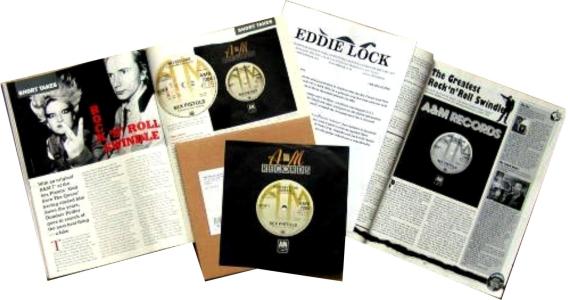
In 2003, there was a bootleg box set of the single replicating the A&M single from 1977.
Steve Jones was voted #97 of Rolling Stone's Greatest Guitarists of All Time.
SOURCES:
Sex Pistols Sign for £150,000. New Musical Express, March 19, 1977.
A&M Draws Sex Pistols; Sees Act As 'New Force.' Chris White. Billboard, March 26, 1977.
Sex Pistols Dropped By A&M In the U.K. Peter Jones. Billboard, April 2, 1977.
Green and the Sex Pistols. Music Week, July 9, 1977.
Sex Pistols contract
| Name | Member Years | Instruments |
|---|---|---|
| Johnny Rotten | 1977 | vocals |
| Paul Cook | 1977 | drums |
| Sid Vicious | 1977 | bass |
| Steve Jones | 1977 | guitar |
| Name | Birth | Death |
|---|---|---|
| Johnny Rotten | 1956-01-31 | |
| Paul Cook | 1956-07-20 | |
| Sid Vicious | 1957-05-10 | 1979-02-02 |
| Steve Jones | 1955-09-03 |

